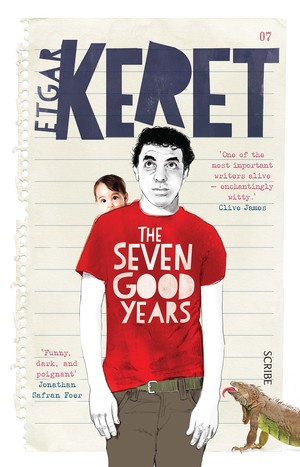Today, 6 of us met for the 21st session of the JCC Israel Book Club, at CBHT at 9:30 a.m.
Our book for this month was The Seven Good Years, by Etgar Keret, which was facilitated by David Leader. David first re-introduced familial and professional information about this 47 year old author, lecturer, and political activist, who is the son of Holocaust survivors. The title’s reference to the story of Joseph and Pharaoh was intended by the author, and, according to the author, represents his ability during this period to see backwards (due to the father’s being alive although dying at the end of the period of time), and forward, because of the birth of his only son (who is now a celebrated actor). This was also expanded by one group member, asking us to think of the first 7 years of a child’s life, where every moment is so new and precious. The other surprising fact that was discussed is that while Keret is quite famous (or infamous, depending on your political bent), this book was written by him in English not Hebrew, and was never intended for Israeli distribution– that is, it is meant to depict for the Diaspora Jew and the world outside of Israel the complexities and contradictions of living there. As well, the themes that non-Israeli audiences would find provocative (like the juxtaposition of his child being born and a terrorist attack near the hospital) are sadly matter-of-fact for the contemporary Israeli (and likely not to be evocative of other than a yawn or a “so what” comment! The idea of selling to a recalcitrant child the idea of getting on the ground to avoid potentially being hit by a bomb or debris as “making a pastrami sandwich” where the parents were the bread and the child was the meat was charming on its face, but awful in terms of the reality of this aspect of “everyday life” in Israel.
This book was universally loved by the group members, and was truly as evocative a book as the author had intended, but in a quiet and understated (which made it differently troubling because of the implications of the “normalcy” of life being presented)! Several who were not as pleased with the other of his works (The Bus Driver Who Wanted to Be G-d) were pleasantly surprised by this work.
Discussed in detail was the sense driven home by the book that the psychological lives of Israelis are full of threats and lack of any degree of future stability/peace. This has to be somehow normalized by them, such that conversations of parents of a 6 month old would conceivably be very proud or worried that their baby when 18+ would need to be placed into real danger that was not likely to be lessened from the present risk. The idea of why Israelis may be likelier to be risk-takers and pressed to get everything that they can get out of every moment was processed. It was also noted that this book represented as good a depiction of the everyday aspects of truly loving non-dysfunctional relationships as one group member can remember having read.
Contact Rochelle Reich to share your interest in participating in the monthly book club. Each month, a new work of fiction or non-fiction by an Israeli author is chosen. The group currently meets on the 3rd Wednesday of each month at 9:30 am at Congregation Beth HaTephila on 43 N. Liberty St.






